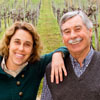
Quinta de Lourosa
Portugal
Vinho Verde
Lousada
Joana de Castro
Factor XPTO: Quinta de Lourosa is not just a wine business: it’s the fruit – both fresh and ripe – of science as well as of passion
Only 40 kilometres from Porto, and very easy to access, Quinta de Lourosa is a quiet place away from the city’s bustle. It’s cosy in winter and pleasurable in spring and summer. It may be enjoyed as a family holiday resort, a week-end hideaway for couples, or a meeting point for business people. The estate provides guided visits to the vineyards and cellars, wine tastings and tourist packs, which include traditional gastronomy, creative cuisine, handicrafts and day trips to sites of historical and cultural meaning. Quinta de Lourosa is an ideal starting point for the discovery of a region rich in Romanesque monuments, old paths, and belvederes.
Quinta de Lourosa (Sousela) is situated in the River Sousa valley, in the heart of the Vinho Verde Route. With its chapel from the 17th century and its farmhouse eaves from the 18th, the estate has been renewed in the last decades, thanks to the efforts of Viticulture Professor Rogério de Castro. The Professor’s affection for the estate is shared by his family: his wife, children, and grandchildren all participate in the everyday farm tasks. Assisted by his daughter, Joana de Castro, the winemaker, he turned Quinta de Lourosa into a place where the respect for nature and tradition goes along with technical innovation and experimentation in winegrowing.
Now covering about 30 hectares, Quinta de Lourosa is well known for pioneering the Lys vine training method. This way to conduct the vine enables a better sun exposure and the growing of sound, ripe grapes, producing a balanced, fresh, fragrant wine, in the best tradition of Vinho Verde making. Along with a new level of scientific thoroughness, Quinta de Lourosa stands by the primacy of environment protection: the plantation of new vineyards is carried out with the utmost respect for the landscape and the soil. Ancient watering methods have been recovered and more rational and ecological techniques have been developed. The quest for the best way to cultivate the vine is a permanent drive at Quinta de Lourosa: new experimentations in alternative vine conduction are constantly taking place.
